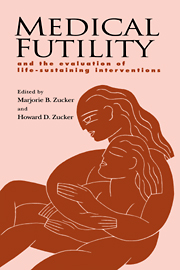Book contents
- Frontmatter
- Contents
- Preface
- Foreword
- Contributors
- 1 Medical futility: a useful concept?
- 2 Death with dignity?
- 3 Physicians and medical futility: experience in the critical care setting
- 4 Physicians and medical futility: experience in the setting of general medical care
- 5 Futility issues in pediatrics
- 6 Medical futility: a nursing home perspective
- 7 Alternative medicine and medical futility
- 8 How culture and religion affect attitudes toward medical futility
- 9 When religious beliefs and medical judgments conflict: civic polity and the social good
- 10 Conflict resolution: experience of consultation-liaison psychiatrists
- 11 Ethics committees and end-of-life decision making
- 12 The economics of futile interventions
- 13 Medical futility: a legal perspective
- 14 Professional and public community projects for developing medical futility guidelines
- 15 Community futility policies: the illusion of consensus?
- 16 Not quite the last word: scenarios and solutions
- Index of cited authors, cases, and statutes
- Subject index
1 - Medical futility: a useful concept?
Published online by Cambridge University Press: 11 September 2009
- Frontmatter
- Contents
- Preface
- Foreword
- Contributors
- 1 Medical futility: a useful concept?
- 2 Death with dignity?
- 3 Physicians and medical futility: experience in the critical care setting
- 4 Physicians and medical futility: experience in the setting of general medical care
- 5 Futility issues in pediatrics
- 6 Medical futility: a nursing home perspective
- 7 Alternative medicine and medical futility
- 8 How culture and religion affect attitudes toward medical futility
- 9 When religious beliefs and medical judgments conflict: civic polity and the social good
- 10 Conflict resolution: experience of consultation-liaison psychiatrists
- 11 Ethics committees and end-of-life decision making
- 12 The economics of futile interventions
- 13 Medical futility: a legal perspective
- 14 Professional and public community projects for developing medical futility guidelines
- 15 Community futility policies: the illusion of consensus?
- 16 Not quite the last word: scenarios and solutions
- Index of cited authors, cases, and statutes
- Subject index
Summary
The problem of medical futility involves two questions.
Are there medical interventions in a specific patient with a particular disease that we can label futile or useless because we are sufficiently confident that they will not be beneficial?
If so, are physicians entitled, or indeed obligated, to refuse to provide those interventions to the patient in question even if the treatment is requested or demanded by the patient or appropriate surrogate?
Those who argue that futility is a dangerous or unhelpful concept that should be abandoned rest their case on the observation that these two questions are extremely hard to answer. I agree that attempting to answer these questions leads us into a thicket of a peculiarly vexing nature, the like of which has seldom been encountered in medical ethics. However, I argue that the concept of futility is unavoidable or can be avoided only by paying far too high a price. We have no choice but to enter the thicket and seek whatever compasses and machetes will best allow us to navigate.
In this chapter, I review some of the arguments commonly raised against the concept of medical futility and then indicate why I think that futility judgments are unavoidable nonetheless. Next, I argue that futility is so closely bound up with critical concepts of professional integrity that medicine risks losing its moral bearings if it ignores the issue.
- Type
- Chapter
- Information
- Medical FutilityAnd the Evaluation of Life-Sustaining Interventions, pp. 1 - 14Publisher: Cambridge University PressPrint publication year: 1997
- 6
- Cited by

